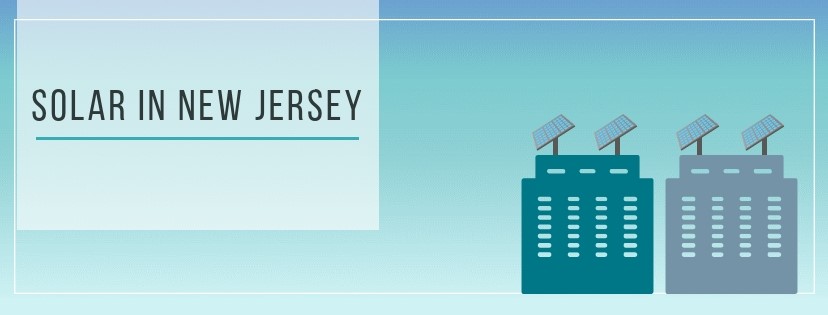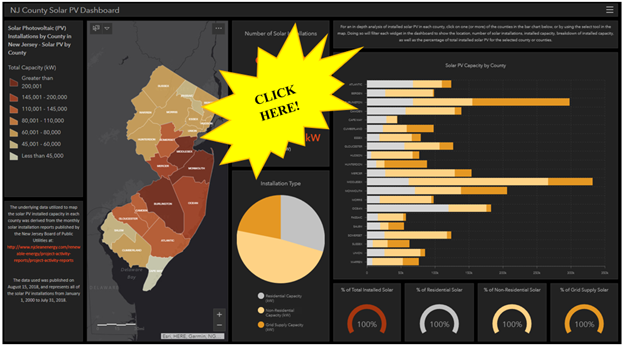
Current State of Solar in NJ:
New Jersey is a national leader with regards to installed solar PV capacity, with more than 4.4 gigawatts (GW) from over 174,692 individual solar PV installations. According to the Solar Energy Industries Association (SEIA), New Jersey is ranked 8th in the United States for totaled installed solar PV capacity, behind California, Texas, Florida, North Carolina, Arizona, Nevada and Georgia.
Click the image below to launch an interactive dashboard to view and analyze the installed solar PV capacity in each of New Jersey’s counties.

For more information, visit the NJ Board of Public Utilities solar reporting website.
Solar Regulations:
Solar Act of 2012
In July of 2012, L. 2012, c. 24 (https://www.njleg.gov/bill-search/2012/S1925) was signed into law. The Solar Act amended certain aspects of the statute that governs the generation, interconnection, and financing of renewable energy and mandated that 4.1% of electricity sales must come from solar by 2028.
Clean Energy Act of 2018
In May of 2018 Governor Murphy signed the Clean Energy Act (https://www.njleg.gov/bill-search/2018/A3723) P.L.2018, c.17. The Clean Energy Act updated and accelerated the solar requirement to 5.1%, which the state attained in April 2020. That milestone triggered the closure of the Solar Renewable Energy Credit (SREC) program, the primary incentivization vehicle for solar in New Jersey for over a decade, to new applications.
- Community Solar
The Community Solar Energy Pilot Program enables utility customers to participate in a solar energy project that is not on their property.
The first year of the pilot program resulted in conditional approvals to 45 community solar projects totaling almost 78 MW of capacity.
The second year of the pilot program resulted in 105 conditional approvals totaling almost 165 MW of capacity.
Instead of conducting a third pilot year, the BPU will be making the program permanent with rules and megawatt targets to be announced.
To support the Community Solar Energy Pilot Program the Bureau of Climate Change and Clean Energy has developed a Community Solar PV Siting Tool to help solar developers, municipalities and interested stakeholders find locations to site community solar arrays. Visit our Solar Siting webpage to learn more about the tool and BPU’s Community Solar webpage to learn more about the program.
- Transition Incentive Program
On May 1, 2020, the solar Transition Incentive Program was launched as the interim program while the Solar Successor Program was being developed by the New Jersey Board of Public Utilities (BPU); it was closed on August 27, 2021.
Solar Act of 2021
On July 9, 2021, Governor Murphy signed the Solar Act of 2021 (https://www.njleg.gov/bill-search/2020/A4554), directing BPU to double the growth of the existing solar program, incentivizing up to 3,750 megawatts (‘MW’) of solar generation by 2026 (750 MW annually).
- Successor Solar Incentive Program (SuSI)
To implement this increased target, the Act, followed by Board of Public Utility’s July 28, 2021 order implementing the program now known as the Successor Solar Incentive Program, ‘SuSI Program’, created two parallel incentive structures:
- Administratively Determined Incentive (ADI)
ADI uses fixed incentives which incents ‘net metered’ facilities 5 MW and less and ‘community solar’ facilities.
- Subsection t
Another component of the ADI is the interim subsection t program of the Solar Act. For an interim period, projects previously eligible to seek conditional certification under subsection t of the Solar Act are available to receive conditional certification under the Administrative Determined Incentive (ADI) interim subsection t program.
- Competitive Solar Incentive (CSI)
The second, which will be administered via a competitive bid system, will be known as the Competitive Solar Incentive (CSI) Program and will incent ‘grid supply’ solar facilities and net metered facilities over 5 MW.
BPU staff is currently working with stakeholders to develop the design of the CSI Program with the goal of holding the first solicitation in the first quarter of 2023.
As with the previous program, a megawatt generated under these programs will be issued renewable energy credits, this time called SREC-II, referencing the original Solar Renewable Energy Credit (SREC) program.
Guidance:
- Solar Siting Analysis: In 2017 the New Jersey Department of Environmental Protection’s (NJDEP) Bureau of Climate Change and Clean Energy released a Solar Siting Analysis (SSA) Update. This report identifies sites where the Department would encourage solar installations from those where the Department would discourage solar installations based on their land use and characteristics. Learn more at our SSA webpage here.
- Solar On Landfill Guidance Document: The NJDEP Solid & Hazardous Waste Management Program has released a document entitled, “GUIDANCE FOR THE PERMITTING OF SOLAR ENERGY SYSTEMS ON NEW JERSEY LANDFILLS” which is available for download here. This document will help guide developers through the process of obtaining the necessary NJDEP permits for installing a solar array on a properly closed landfill in New Jersey.
- US EPA RE-Powering America’s Land Initiative: EPA is encouraging renewable energy development on current and formerly contaminated land and mine sites when it is aligned with the community’s vision for the site. This initiative identifies the renewable energy potential of these sites and provides other useful resources for communities, developers, industry, state and local governments or anyone interested in reusing these sites for renewable energy development. Guidance on Re-Powering America’s Lands Initiative’s plans, incentives, mapping tools, site data, success stories and training events can be found here.
- Solar Panel Recycling Initiatives: Given that solar panels contain a number of hazardous materials and that their useful lifespan is limited, policy makers in New Jersey have passed a law which begins the process of finding an appropriate pathway for old solar panels and associated materials and structures.
Under a law passed in 2019 a commission has been established the ”purpose of [which] shall be to investigate options for recycling and other end-of-life management methods for photovoltaic and other solar energy generation structures, and to develop recommendations for legislative, administrative, or private sector action…
The Department of Environmental Protection may adopt, pursuant to the ‘Administrative Procedure Act,’ P.L.1968, c.410 (C.52:14B-1 et seq.), rules and regulations based on the recommendations contained in the report submitted by the ‘Solar Panel Recycling Commission,’ established pursuant to section 1 of this act, concerning recycling or other end-of-life management methods for photovoltaic and other solar energy generation structures.”
The New Jersey Department of Environmental Protection (DEP) also has a special role in these initiatives given that the Department’s Commissioner, or designee, will have a seat on the nine member commission, The Department will provide staff support to the commission, the required report will be published on DEP’s web site, and DEP will be the department to write and adopt any rules based on the recommendations of the commission.